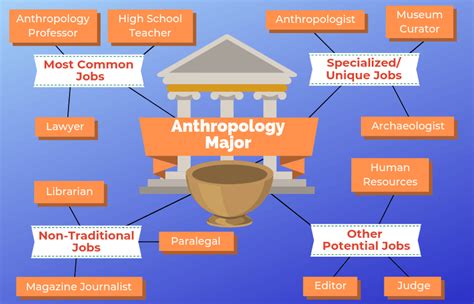Anthropology, the study of humanity and human culture, offers a versatile degree that opens doors to a diverse array of career paths. From exploring ancient civilizations to examining modern societies, anthropologists delve into the complexities of human behavior, history, and interactions. With a strong intellectual foundation and a unique interdisciplinary approach, anthropology majors are well-equipped to navigate a wide range of professional fields.

Navigating the Vast Landscape of Career Options
According to the American Anthropological Association, over 70,000 anthropologists are employed in various sectors across the United States. The field offers both traditional and emerging career paths, providing ample opportunities for graduates to pursue their interests and make a meaningful impact on society.
Traditional Anthropology Careers
-
Archaeologist: Uncover the secrets of past civilizations by studying ancient artifacts, structures, and landscapes.
-
Cultural Anthropologist: Immerse yourself in different cultures to understand their values, beliefs, and practices.
-
Linguistic Anthropologist: Analyze the structure and evolution of human languages, shedding light on cultural diversity.
-
Physical Anthropologist: Study the biological variation and evolution of humans, examining human remains, genetics, and health.
Emerging Anthropology Careers
-
Data Analyst: Apply anthropological insights to analyze complex datasets and extract meaningful patterns for businesses and organizations.
-
Human Factors Specialist: Design and improve systems to enhance human performance and interaction in various industries, such as healthcare, transportation, and technology.
-
International Development Worker: Engage in humanitarian efforts and promote sustainable development by addressing global challenges and fostering intercultural understanding.
-
Museum Curator: Manage and interpret anthropological collections, preserving cultural heritage and educating the public.
Beyond the Traditional Paths
The versatile nature of an anthropology degree allows graduates to explore unconventional career paths that align with their passions and skills. Consider these innovative applications:
-
Forensic Anthropologist: Analyze human remains to assist in criminal investigations and uncover the circumstances surrounding deaths.
-
Medical Anthropologist: Study the interplay between culture, health, and illness, informing public health policies and improving patient outcomes.
-
Tech Anthropologist: Combine anthropological insights with technological expertise to design user-friendly products, services, and experiences.
-
Visual Anthropologist: Use photography, film, and other visual media to document and analyze cultural practices, fostering understanding and cross-cultural communication.
The Value of an Anthropology Degree
Skills and Expertise:
- Critical thinking and problem-solving
- Cultural sensitivity and adaptability
- Research and analysis abilities
- Excellent communication and interpersonal skills
- Proficiency in data collection and interpretation
Earnings Potential:
- According to PayScale, the median annual salary for anthropologists with a bachelor’s degree is $65,000.
- With additional education and experience, anthropologists can earn significantly more, with some earning over $100,000 per year.
Job Outlook:
- The Bureau of Labor Statistics projects a 6% growth in anthropology jobs over the next decade, faster than the average for all occupations.
- This growth is driven by increasing demand for anthropologists in areas such as healthcare, international development, and data analysis.
Crafting a Successful Career Path
- Explore Your Interests: Identify your passions within the field of anthropology and pursue careers that align with them.
- Gain Practical Experience: Participate in internships, field research, and volunteer opportunities to develop real-world skills and build connections.
- Network and Build Relationships: Attend conferences, join professional organizations, and connect with potential employers to expand your career options.
- Consider Further Education: Pursue a master’s or doctoral degree to enhance your expertise and specialize in a particular area of anthropology.
- Stay Current with Trends: Keep abreast of emerging trends and developments in the field to remain competitive and adaptable in the job market.
Tips for Success in Anthropology Careers
- Develop a strong foundation in anthropological theory and research methods.
- Cultivate cultural sensitivity and empathy to effectively interact with diverse populations.
- Hone your communication skills to convey anthropological insights clearly and persuasively.
- Embrace flexibility and adaptability to navigate the evolving job market.
- Seek mentorship and guidance from experienced anthropologists to gain valuable insights and support.
FAQs About Anthropology Careers
1. Is it possible to have a successful career with an anthropology degree?
Yes, an anthropology degree provides a solid foundation for a wide range of careers. With its interdisciplinary approach and emphasis on critical thinking, cultural understanding, and research skills, anthropology graduates are highly sought after in various industries.
2. What are some of the highest-paying anthropology jobs?
Some of the highest-paying anthropology jobs include forensic anthropologist, medical anthropologist, data analyst, and international development worker.
3. Is it necessary to get a graduate degree to work as an anthropologist?
While a bachelor’s degree is sufficient for some entry-level positions, a master’s or doctoral degree is often required for more advanced roles in research, teaching, and policymaking.
4. What are some of the challenges that anthropology graduates may face?
Anthropologists may face challenges such as limited funding for research projects, competition for tenure-track teaching positions, and the need to adapt to changing societal needs.
5. What are some of the rewarding aspects of an anthropology career?
Anthropology careers offer the opportunity to make a real difference in the world, explore different cultures, and contribute to our understanding of humanity.
6. What are some of the emerging trends in anthropology careers?
Emerging trends include the increasing demand for data analysts with anthropological expertise, the use of technology in anthropological research, and the growing focus on global health and sustainable development.
7. What can I do with an anthropology degree if I am not interested in traditional anthropology careers?
Anthropology graduates can explore careers in areas such as human factors, museum studies, and user experience design, where their skills in cultural understanding, research, and critical thinking are highly valued.
8. How can I prepare myself for a successful career in anthropology?
Prepare for a successful career by developing strong analytical and research skills, cultivating cultural sensitivity, gaining practical experience, networking with professionals, and staying informed about current trends in the field.
